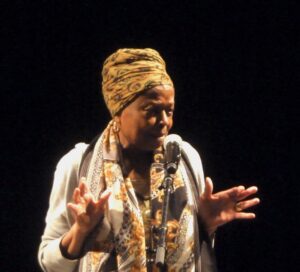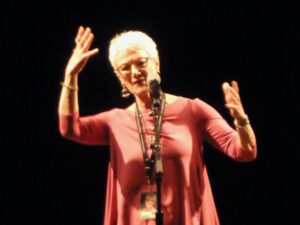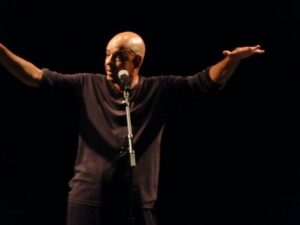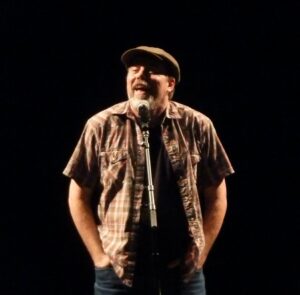
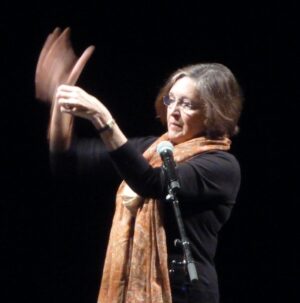
A bumper sticker on my desk says, “The Shortest Distance Between Two People Is a Story.” I got it at a storytelling event years ago. I’ve always regarded storytellers — whether on the stage or the back porch — with admiration and awe.
Most of my storytelling takes place on the page. The oral sharing of story is an art that has existed since the beginning of humankind. In caves and around campfires, the storyteller has engaged, educated, enlightened, entertained, recorded and passed on history and tradition. Before the written word, perhaps before language as we know it, storytellers have been held in esteem — respected, trusted, sought for wisdom and advice, looked to for humor and consolation.
The power of story is why masters like Donald Davis, Jackie Torrence (sadly deceased), Carmen Deedy, and Bil Lepp can hold me spellbound. They take me to wondrous places, leave me limp as a rag doll, emotionally exhausted from hilarity or pain — sometimes heartbroken, yet happy, and wanting more. I felt this way in September while attending the 34th annual Timpanogos Storytelling Festival in Utah with my dear friend and former library colleague, Lori Snyder. (We’re both retired now.) We’ve enjoyed the Festival for the past few years. It was two days of splendor, our only frustration being forced to chose between tellers with conflicting time slots.
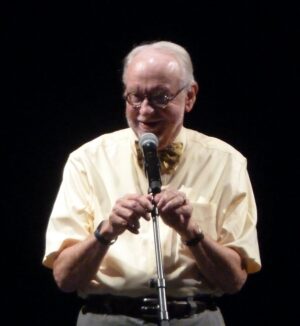
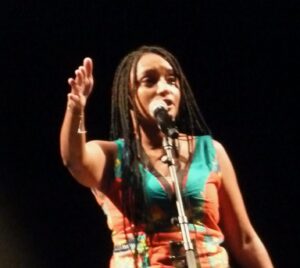

I’ve told stories as a children’s librarian. I’ve been a member of the National Association for the Preservation and Perpetuation of Storytelling (now the National Storytelling Network) and am currently a veteran member of Storytellers of New Mexico, yet I never considered myself a storyteller in terms of the spoken arts. That’s best left to the masters.
I was a children’s librarian for 27 years and have dressed as a chef, a pirate, a cowboy, an explorer, and more in the name of promoting reading with kids. One year the theme of my library’s summer reading program was superheroes, so I asked my sister, Renee, to make me a cape with the letters “S. L.” sewn on. The first time I wore it at the library, the kids asked, “What’s that stand for?”
I said, “In light of our theme, what do you think?”
“Super Lady!” someone said.
“I like that,” I said.
Someone else shouted, “Super Librarian!”
“Sounds good to me,” I said, and we went forward with the day’s program. But it occurred to me that the cape might be more than a superhero costume.
When summer reading ended and we resumed our regular story time programs, I continued to wear the cape. Some times I’d be “Song Lady.” Other times I’d be “Story Lady.” One of the kids even said it could mean “Silly Lady,” which I joyously embraced.
One day, after story time, I was helping one of my older library kids find books. I was wearing the cape and he asked, “Are you still Super Librarian?”
I said, “I hope so,” and explained how I was using the cape in story time. “What else do you think this could stand for?”
He thought a moment, then said, “Story Land!”
I hugged him. “I love that!”
I love it because my young reader had come to see me not just as a person, but as a PLACE, a land filled with stories, a kingdom where stories happen, are told and loved. It felt huge, almost like I was a whole library all by myself.
The Timpanogos Storytelling Festival is just that — Story Land. It fills me with all things good in that moment, the things that help carry me through my days going forward.
Thanks, Timp! See you next year.
